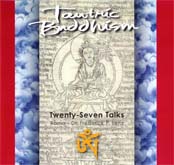
Tantric Buddhism
Computer Science
I like computers.
I've got a few of them, and I keep them around the house. Sometimes they're turned on, sometimes they're turned off. I like them as much when they're off as when they're on. I just like computers. They're like pets - but you don't have to feed them too much, a little electricity once in a while. But they're nice. Sometimes I get different ones just because I like the way they look. They're just fun to have around the house. I like their aura. I like their energy. I like the energy of computers.
Computer science is very interesting from an occultist's point of view because it has to do with zeros and ones - it has to do with analysis. In order to experience enlightenment, in order to be enlightened, to be enlightenment, in order to raise into upper gradients of pure celestial light, it is necessary to refine the mind completely. The issue is style.
There is style in fashion, but there is style in states of mind. Some people are connoisseurs of states of mind, just as some people are connoisseurs of wine, food, countries, lovers. Buddhists are connoisseurs of states of mind. We savor certain states of mind. States of mind always exist. They're always there, unlike the old Beaujolais, which this is the last bottle of. The state of mind will always be there. And when you've been around the universe for lots and lots of incarnations and experienced lots of states of mind, there are certain states of mind you learn to particularly appreciate.
The trick is getting to them. There may be some wonderful wine but it's very expensive and you don't have the money. So there are certain states of mind - the most beautiful ones are very hard to get to. They're like places on earth that are beautiful. You have to travel a long way these days because the earth is very populated and the most beautiful places are very inaccessible. So, if you are a true lover of natural beauty, you have to travel a long way.
The states of mind that we seek are inside ourselves. They're inside our mind. Our mind is a databank - not the brain, but the mind, the consciousness principle that we are. That which is the existence in us is infinite. It contains many things, as it does infinity, as it is infinity. But in particular it contains what we call the ten thousand states of mind. Ten thousand is a symbolic number in Buddhism which just suggests that there's a lot - a tremendous amount, more than ten thousand, more than ten billion, beyond counting is what ten thousand symbolizes.
That's good, and it's nice those states of mind are there, and it's wonderful that there are enlightened states of mind and ecstasy and knowledge that human beings don't know about. But how does one get there? How does one get to this paradise of mind?
It's through refinement. It's by developing a sense of style. I would say that style is the opposite of mediocrity. Mediocrity implies a lack of exactness - colors run together and get kind of gray, you see? Style, on the other hand, implicit in it is a certain awareness of not only what style is, but an ability to extract from the vast multitude of things, those things which are brightest.
So what becomes necessary is a process of extraction. How can we extract from all of infinity, and the various infinite states of mind, those that are the most bright? In order to do that, we have to become very exact. We have to make our minds very sharp so that out of millions of possible states of mind, we can feel intuitively and select those states of mind which are the most bright and the most beautiful. Buddhists spend a great deal of time working on and refining their minds. Because once the mind is properly refined, it will automatically select the right states of mind. It just happens by itself. What's necessary is just to refine the mind.

